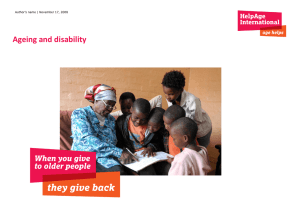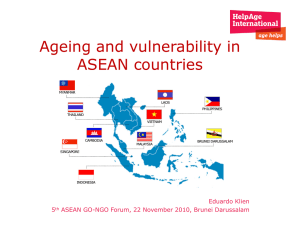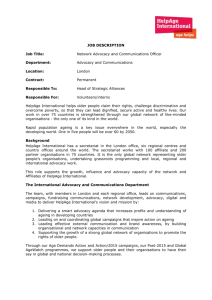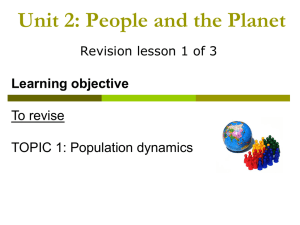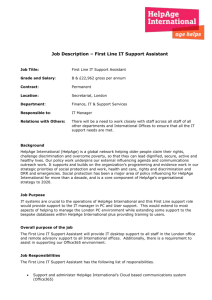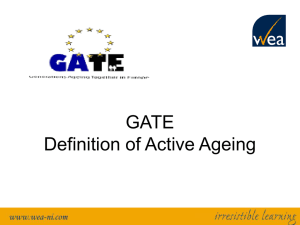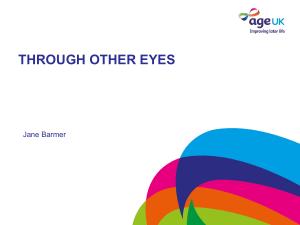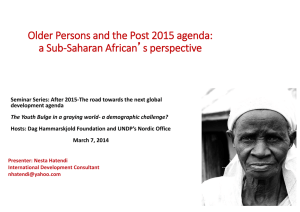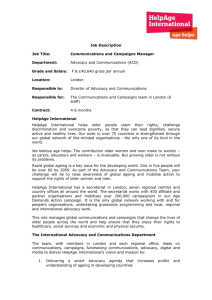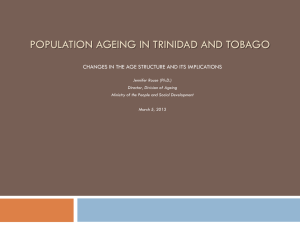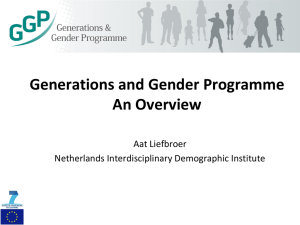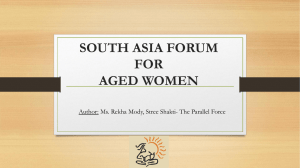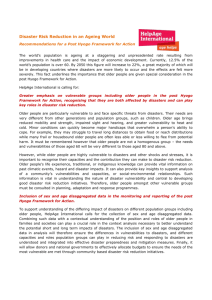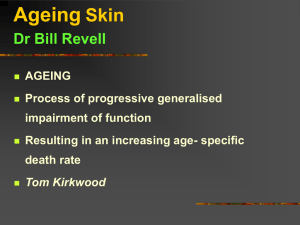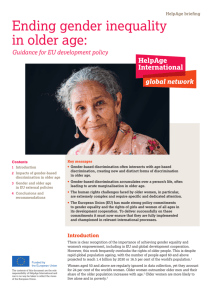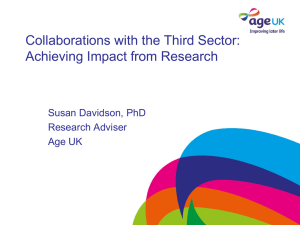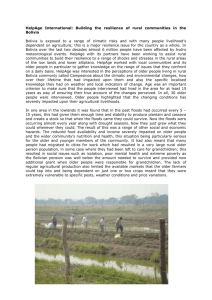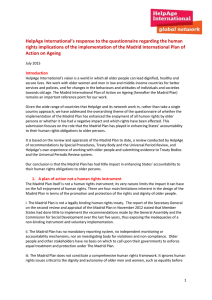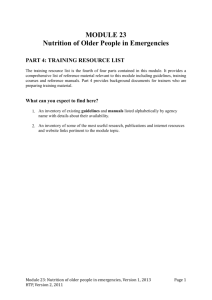The global ageing century: Challenges & opportunities
advertisement
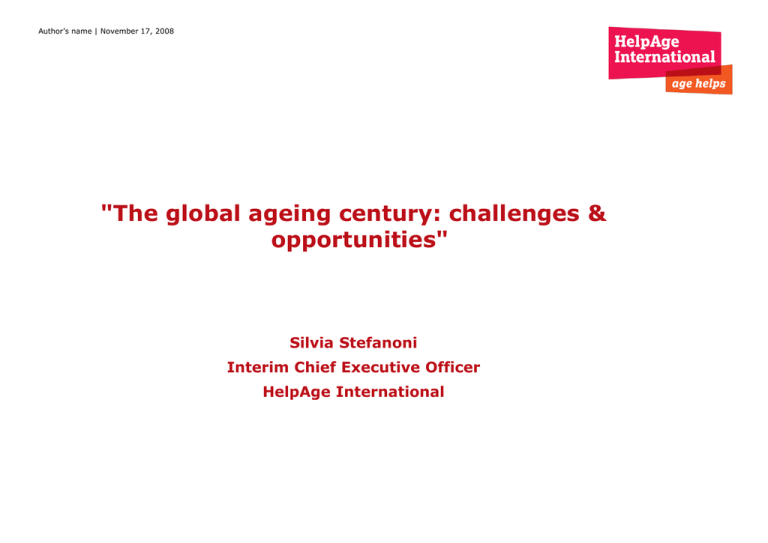
Author’s name | November 17, 2008 "The global ageing century: challenges & opportunities" Silvia Stefanoni Interim Chief Executive Officer HelpAge International 2 | HelpAge International | Presentation title | Author’s name | November 17, 2008 The Century of Ageing • The 21st century is the century of ageing – “The new millennium closes the first chapter in human history: when we were young” (Paul Wallace: “Agequake”) • Life expectancy is extending worldwide, fertility rates are falling, and ageing is accelerating. “The ageing of humanity across the world is a defining stage in history. It will change everything from business and finance to society and culture” (Wallace) Author’s name | November 17, 2008 Demographic transition • In 2009, the global number of older people passed 700 million. This is projected to be 2 billion by 2050. Already two-thirds live in low & middle income countries • In the “more developed” regions over 20% of the population is 60+. By 2050, nearly 33% of the population is projected to be in that age group • In the “less developed” regions, older people account today for 8% of the population; by 2050 they are expected to account for over 20% Author’s name | November 17, 2008 Longer lives everywhere… Author’s name | November 17, 2008 The future that’s here already 18 16 % of population 14 12 10 8 6 4 2 0 1950 1960 1970 1980 Older people 1990 2000 2010 Young children 2020 2030 2040 2050 6 | HelpAge International | Presentation title | Author’s name | November 17, 2008 The poorest and the oldest • The pace of population ageing is fastest in low- and middle-income countries • The population of older people is itself ageing. Among those aged 60 years or over, the fastest growing population is that of the oldest-old, those aged 80 years or over 7 | HelpAge International | Presentation title | Author’s name | November 17, 2008 Asia has the largest, fastest growing older population 700 600 500 1950 1990 2025 400 300 200 100 0 Oceania Nth america Sth america Africa Europe Asia Author’s name | November 17, 2008 Why global population ageing matters “Despite the…evidence, the significance of population aging and its global implications have yet to be fully appreciated. Preparing …for longer lives and finding ways to reduce age-related disability should become national and global priorities. For nations, as for individuals, it is critical to address problems sooner rather than later. Waiting significantly increases the costs and difficulties of addressing these challenges”. Paula J. Dobransky, Under-Secretary for Democracy & Global Affairs, U.S. Department of State 2007 Author’s name | November 17, 2008 10 | HelpAge International | Presentation title | Author’s name | November 17, 2008 A demographic dividend? By 2020 the Asian “economic miracle” will still be driven by demographic change • High rates of investment and saving will continue… • …highest possible numbers of “working-age” adults in e.g. India & China • …resources which had been used to bring up children will be free for saving 11 | HelpAge International | Presentation title | Author’s name | November 17, 2008 A demographic dividend • By 2030 – will the “Asian demographic window begin to close” as many in work-forces in a number of countries enter their sixties? • Countries in East Asia & Latin America will experience rapidly ageing populations with changing economic needs, changing health status Author’s name | November 17, 2008 An older workforce? • Already millions work into old age– especially in low-income countries. These numbers are likely to continue to grow • Much of this work is unpaid or poorly paid & the challenge is to provide “decent work” Author’s name | November 17, 2008 Ageing & health A key priority for older people in low- and middle-income countries • Many poor people enter old age in poor health – lifetimes of physical labour, poor diet and environments, multiple pregnancies • Health services are rarely “age friendly” – physically inaccessible health providers have low levels of relevant knowledge attitudinal barriers especially where resource are scarce Author’s name | November 17, 2008 Epidemiological transition • In low-income countries - a shift from infectious diseases, poor nutrition & hygiene to chronic diseases • Rapid health gains of 20th Century due to new drugs & technologies have been difficult to sustain in low-income countries • More limited progress in clean water supply, sanitation and basic education • “Double burden” in many countries - both communicable and noncommunicable disease Author’s name | November 17, 2008 Health systems & ageing •In low-income countries health systems, established in times of high fertility and low population growth, focussed on mother & child health • Focus on reproductive healthcare & concerns about HIV & AIDS • Curative services have been prioritised limited services for older people • MDGs very influential – health targets are on M&CH & combating HIV & AIDS + other infectious diseases (TB & Malaria) Author’s name | November 17, 2008 The rising demand for care • Rapid growth in the number of the oldest old • Increase in labour force participation by women & growing migration • Attitudes to care-giving show signs of changing • In 2010 an estimated 35.6 million people are living with dementia – this is projected to double every 20 years, reaching 115.4 m in 2050 Author’s name | November 17, 2008 Why this matters Long-term chronic illness and the need for long-term care have major impacts on individuals and households psychological stress – for older people and caregivers economic burden – producers become consumers of care societies and economies loss of productivity, lost development 18 | HelpAge International | Presentation title | Author’s name | November 17, 2008 Chheut (68) has been looking after five grandchildren. Four are the children of his son and daughter in law, who died about four years ago. “People said it was AIDS”. “ In the past my wife would help. But she needed to work and the only job she could get was near the Thai border.” He still grows crops on his remaining land. “and all the children have never stopped going to school.” “During Khmer New Year and at spiritual ceremonies his sons visit, and if they can’t come they send money. I had thought that I would give them all my assets – land, oxen and ox carts. But they say don’t worry about passing on the assets.” Chheut, 68, Battambang Province, Cambodia (c)Jon Bugge /HelpAge International 19 | HelpAge International | Presentation title | Author’s name | November 17, 2008 Ciprian, (77) a farmer in Peru. “I am one of the lucky ones. I worked in a government factory for 28 years. Now I receive a small pension and my wife and I also have health insurance”. “But even with our pension it is difficult to make ends meet. Rice has gone up three-fold just in the last 6 weeks. My wife and I work in our small field seven or eight hours every day to grow vegetables to supplement our diet. The pension doesn’t cover our living costs like electricity”. “My other children have moved to other parts of Peru & find it hard enough to survive without supporting us”. Author’s name | November 17, 2008 Opportunities in the ageing century •The world has never been more able to afford financing solutions •Health promotion and disease prevention at all ages •Accessible and appropriate health & social care •Social protection – the “social floor”
